Collingwood Battalion Memorial Service
Collingwood Battalion Memorial Service, 10th June 2022
A Report by Stephen Chambers
It was a honour to represent The Gallipoli Association at the Collingwood Battalion Memorial Service at Blandford Camp on 10th June 2022. This event, whilst not on the 4th June this year, remembers the Collingwoods, the RND and Gallipoli. It was good to see over 40 people attend this event, including several Gallipoli Association members.
The service began with an introduction by Mr Stuart Adam, Trustee Collingwood Memorial, and then an "Off Caps" by members of HMS Collingwood.
The Rev Jon Backhouse (RN Chaplain) then took the service to remember the Officers and Men of the Collingwood Battalion of the Royal Naval Division. After the Lord's Prayer and Naval Hymn, and prayers of thanksgiving and hope, there was the signal for "On Caps" before the exhortation and Act of Remembrance with the words "Let us remember before God and commend to his sure keeping those who died in our battalion and whose memory we treasure in this place on this anniversary. We will remember them."
Wreaths were then laid by The High Sheriff of Dorset, Mayor of Blandford, MP for North Dorset, Chairman and President of the Blandford RBL, The Gallipoli Association and the Garrison Commander.
After the Last Post, two-minutes silence and the Reveille, the The Kohima Epitaph was read "For your tomorrow we gave our today", ending with the National Athem.
Those attending were then treated to Tea and Coffee at the Officers Mess, thanks to the generosity of Garrison Commander, Royal Signals.
It was such a wonderful and very well organised event.
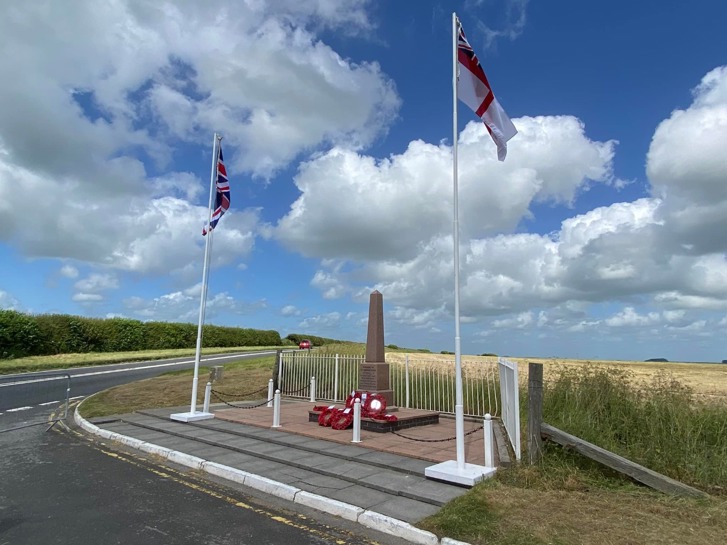
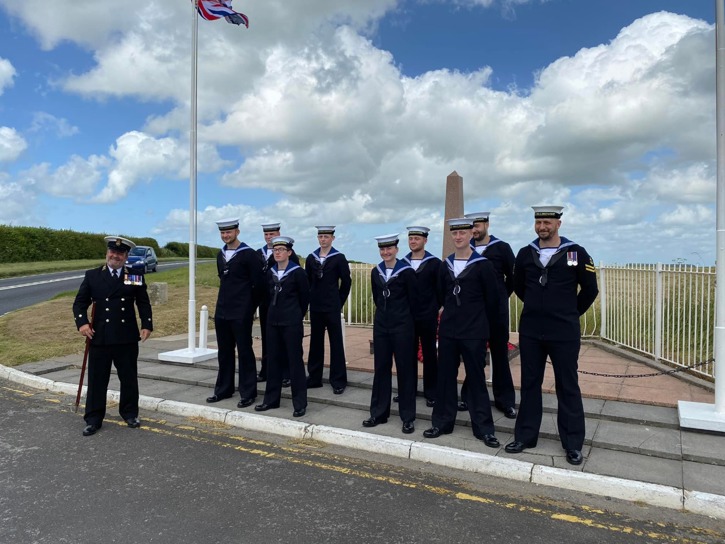
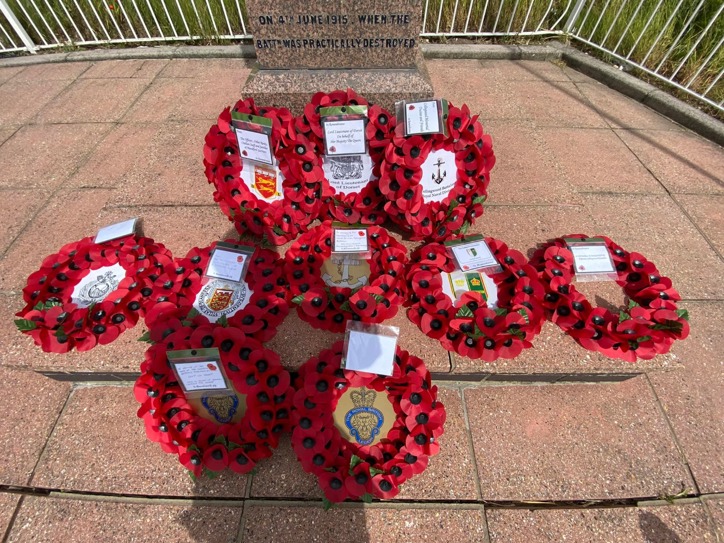
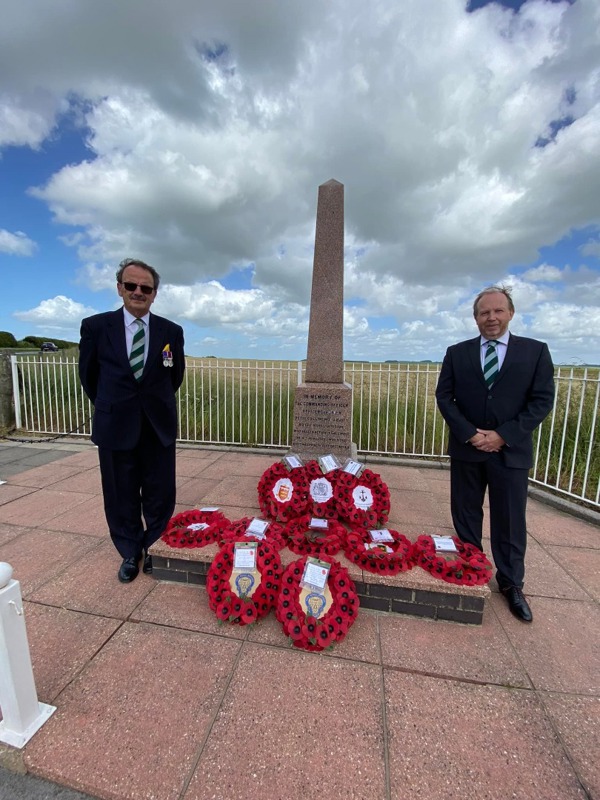
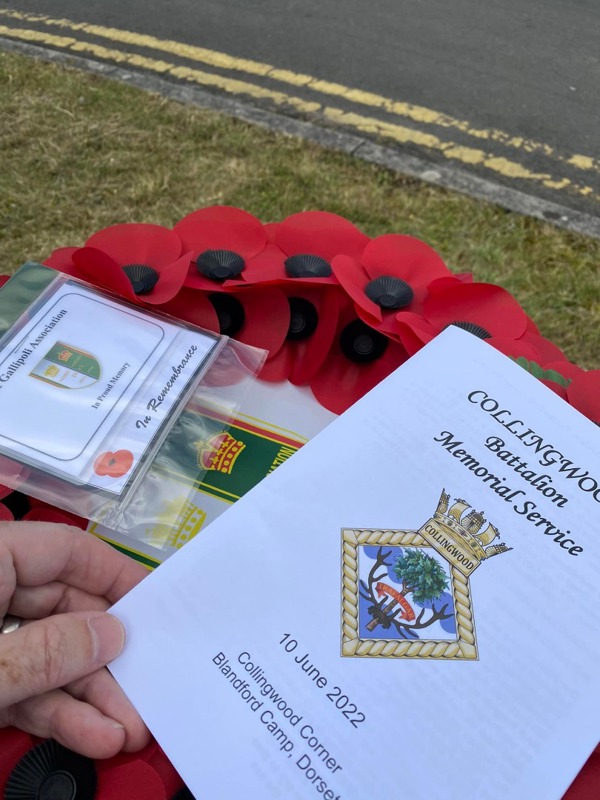
The Royal Naval Division
At the outset of the First World War the Royal Navy (RN) called up every member of every type of RN reserve organisation and found themselves with many more men than berths on ships or establishments. The Army did the same.
The then First Lord of the Admiralty, Winston Churchill, enacted a concept considered prior to the war that a division of naval Infantry should be formed. The task of the Division was to seize and hold ports to enable the Royal Navy to operate from them. The Royal Navy had a long history of operations ashore, remembering that Lord Horatio Nelson received his eye injury and arm injury while participating in a land operation.
The Division initially formed in tented camps at Walmer (1st Brigade) and Betteshanger (2nd Brigade) near Deal in Kent while awaiting the building of a permanent camp at Blandford in Dorset. The Crystal Palace was also taken up as a Royal Naval Division (RND) location.
The Division consisted of three brigades. The first and second brigades were composed of the ‘reservists’ called up (including some Army transfers). The third brigade was formed from battalions of the Royal Marines Light Infantry.
1st and 2nd Brigade Battalions were named after Admirals:
1st Brigade: Drake, Benbow, Hawke and Collingwood Battalions
2nd Brigade: Hood, Nelson, Anson and Howe Battalions
3rd Brigade, The Marine Brigade Battalions were named after locations:
9th (Portsmouth), 10th (Plymouth), 11th (Chatham) and 12th (Deal)
The RND were deployed to Antwerp in October 1914 to take over trenches from Belgians surrounding Antwerp. Savaged by German attacks, the Division withdrew but many men were lost or interned (neutral Netherlands) or seized as Prisoners of War.
Reformed at Blandford Camp, retrained and issued with tropical kit, they were then sent to the Dardanelles to take part in the Gallipoli Campaign.
On 4th June 1915, at midday, the RND first wave advanced against Turkish trenches, the second wave left at 1215. By 1245 1,060 officers and men of RND lay dead. The Collingwood Battalion received so many casualties that the remaining men were used as battle casualty replacements and the Battalion never reformed. The memorial at Blandford Camp is to the Collingwood Battalion primarily.
After Gallipoli the RND returned to Blandford, reformed again and were then sent to the Western Front under Army Command as the 63rd (RN) Division. They acquitted themselves extremely well in all battles from the Somme to the final Hindenburg Line battles. The Division was formally disbanded on 4th June 1919 on Horse Guards Parade, London, the current site of their divisional memorial.
--
Stephen Chambers
Historian & Webmaster and Trustee
The Gallipoli Association
